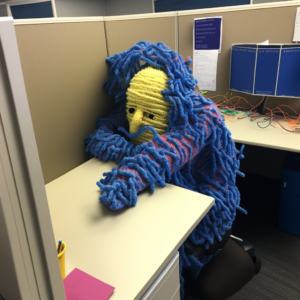For many people with autism, morning anxiety can be stressful. The sensory overload and social demands of the day can be overwhelming, making it difficult to start the day on a positive note. However, with the right strategies and support, it is possible to manage morning anxiety and start the day with confidence.
Mornings can be especially challenging for autistic people because autism can affect a person’s sensory processing, communication, and social skills, which can make it harder to navigate the daily demands of life.
In the morning, the brain and body need to adjust to a new day, which can be an overwhelming experience for some autistic adults. Sensory inputs, such as light, sound, and touch, can be particularly challenging, and it can take time to adjust to the new environment. Additionally, autistic adults may have difficulty with executive functioning skills, such as planning, prioritizing, and initiating tasks, which can make it hard to get going in the morning.
However, with some simple strategies and support, autistic adults can learn to manage the challenges of mornings and start their day on a positive note.
7 Tips for Managing Autism Morning Anxiety
Here are seven strategies to manage autism morning anxiety and help autistic adults start their day with more ease and comfort:
1. Create a Morning Routine
Having a structured routine can provide a sense of predictability and control, which can be helpful for many autistic adults. Establishing a morning routine that includes self-care activities, such as taking a shower, getting dressed, and eating breakfast, can help set the tone for the day and make it easier to transition into other tasks.
2. Use Visual Schedules and Timers
Visual schedules and timers can be helpful tools for organizing and planning morning tasks. Using pictures, icons, or written lists can help make tasks more concrete and easier to understand. Additionally, setting timers or alarms can provide a sense of structure and help with time management.
3. Plan Ahead
Preparing for the morning the night before can help reduce stress and anxiety in the morning. For example, laying out clothes, packing a lunch, or making a to-do list can help simplify the morning routine and make it easier to get going.
4. Incorporate Sensory Strategies
Sensory strategies, such as deep breathing, stretching, or using a weighted blanket, can help regulate the nervous system and provide a sense of calm. Autistic adults may benefit from incorporating sensory strategies into their morning routine to help manage sensory overload and anxiety.
5. Ask for Support
Asking for support from friends, family members, or professionals can be helpful for managing morning challenges. For example, a support person may be able to help with tasks, provide encouragement, or offer emotional support.
6. Choose Comfortable Clothing
Wearing comfortable clothing that is well-suited for the day’s activities can help autistic adults feel more at ease and confident. It is important to choose clothing that feels good and provides sensory comfort.
7. Prioritize Self-Care
Prioritizing self-care in the morning can help set the tone for the day and promote a sense of well-being. For example, taking time to engage in a relaxing activity, such as reading or listening to music, can help reduce stress and anxiety.
Reflection Questions
Here are some reflection questions to consider as an autistic adult looking to manage morning challenges:
- What specific morning challenges do I experience, and how do they impact my day?
- How can I incorporate the strategies listed above into my morning routine?
- What additional sensory strategies can I use to regulate my nervous system in the morning?
- Who can I ask for support and encouragement when I struggle with morning tasks?
- What self-care activities can I prioritize in the morning to promote well-being?
Reflecting on these questions and implementing the tips above can help autistic adults manage morning challenges and start their day on a positive note.
In conclusion, mornings can be challenging for autistic adults due to sensory processing, executive functioning difficulties, and other factors. However, with the right strategies and support, it is possible to manage morning challenges and start the day more easily and comfortably.
By creating a morning routine, using visual schedules and timers, planning, incorporating sensory strategies, asking for support, choosing comfortable clothing, and prioritizing self-care, autistic adults can set themselves up for success in the morning and throughout the day.
By incorporating these strategies, you can manage autism morning anxiety and start the day with confidence. Remember to reflect on your specific needs and challenges and seek support when needed. With patience, perseverance, and self-care, you can start your day on a positive note!
Similar Articles

Creating an Autism Friendly Home Environment
Table of Contents Introduction Benefits of an Autism Friendly Home Environment for Late-Diagnosed Autistic Adults Importance of Communication and Collaboration in Creating an Autism Friendly

Mindfulness and Autism: Exploring the Benefits of Meditation for Late-Diagnosed Autistic Adults
Table of Contents Mindfulness and Autism: Introduction Understanding the Connection Between Mindfulness and Autism Mindfulness-Based Interventions for Autism: Current Research and Future Directions The Benefits

Autism Independent Living: Strategies for Helping Late-Diagnosed Autistic Adults Live on Their Own
Table of Contents Autism Independent Living: Introduction Navigating Social Situations and Building Relationships as an Autistic Adult Creating a Support Network for Autism Independent Living









